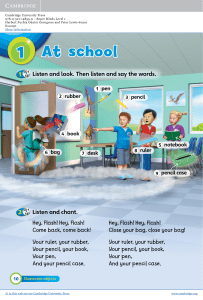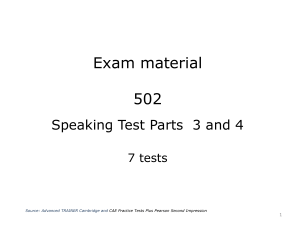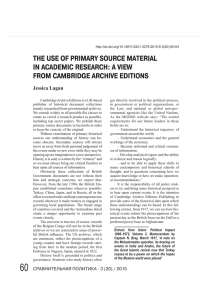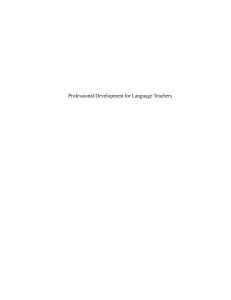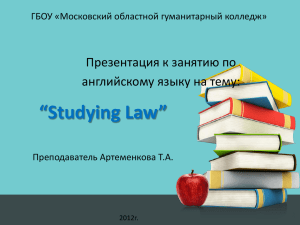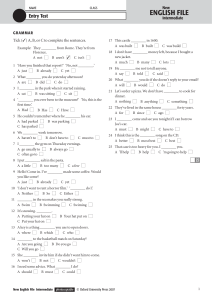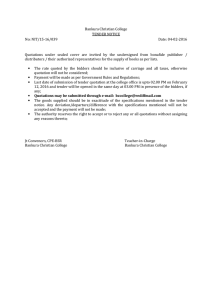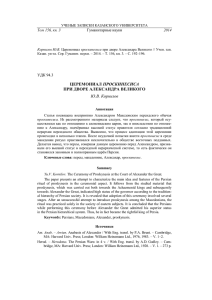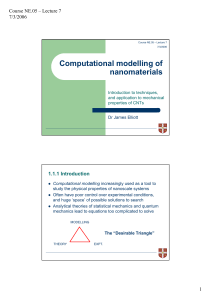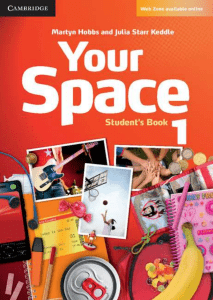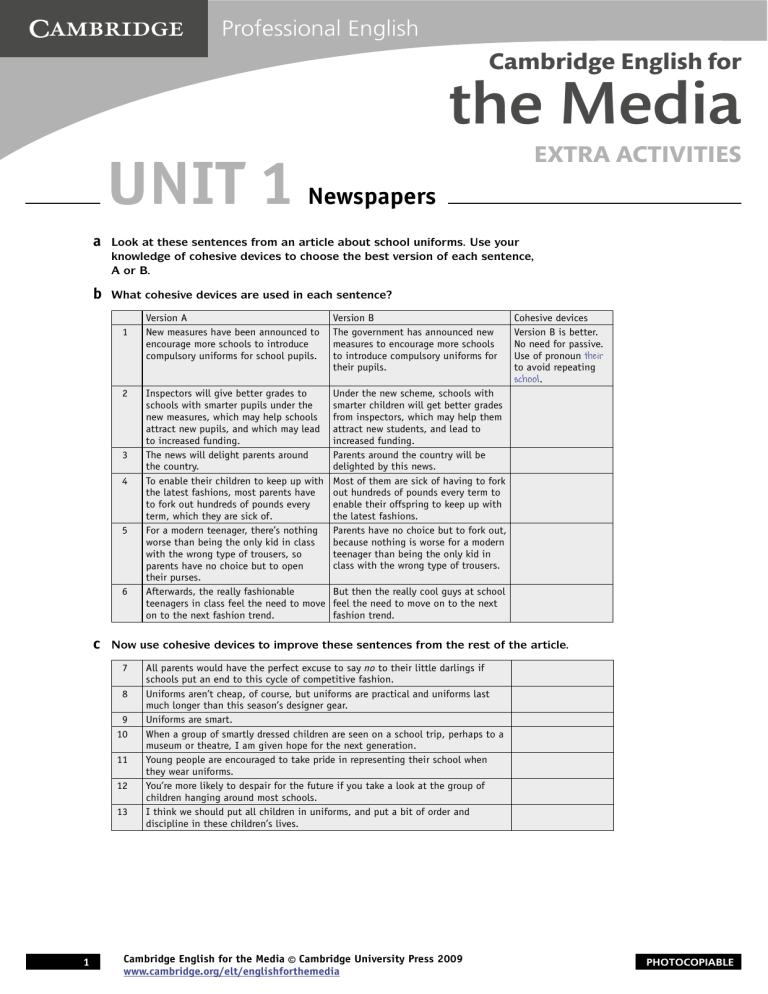
Professional English Cambridge English for the Media UNIT 1 Newspapers a Look at these sentences from an article about school uniforms. Use your knowledge of cohesive devices to choose the best version of each sentence, A or B. b What cohesive devices are used in each sentence? 1 2 3 4 5 6 c Version A New measures have been announced to encourage more schools to introduce compulsory uniforms for school pupils. Version B The government has announced new measures to encourage more schools to introduce compulsory uniforms for their pupils. Inspectors will give better grades to schools with smarter pupils under the new measures, which may help schools attract new pupils, and which may lead to increased funding. The news will delight parents around the country. To enable their children to keep up with the latest fashions, most parents have to fork out hundreds of pounds every term, which they are sick of. For a modern teenager, there’s nothing worse than being the only kid in class with the wrong type of trousers, so parents have no choice but to open their purses. Afterwards, the really fashionable teenagers in class feel the need to move on to the next fashion trend. Under the new scheme, schools with smarter children will get better grades from inspectors, which may help them attract new students, and lead to increased funding. Parents around the country will be delighted by this news. Most of them are sick of having to fork out hundreds of pounds every term to enable their offspring to keep up with the latest fashions. Parents have no choice but to fork out, because nothing is worse for a modern teenager than being the only kid in class with the wrong type of trousers. Cohesive devices Version B is better. No need for passive. Use of pronoun j^[_h to avoid repeating iY^eeb. But then the really cool guys at school feel the need to move on to the next fashion trend. Now use cohesive devices to improve these sentences from the rest of the article. 7 8 9 10 11 12 13 1 EXTRA ACTIVITIES All parents would have the perfect excuse to say no to their little darlings if schools put an end to this cycle of competitive fashion. Uniforms aren’t cheap, of course, but uniforms are practical and uniforms last much longer than this season’s designer gear. Uniforms are smart. When a group of smartly dressed children are seen on a school trip, perhaps to a museum or theatre, I am given hope for the next generation. Young people are encouraged to take pride in representing their school when they wear uniforms. You’re more likely to despair for the future if you take a look at the group of children hanging around most schools. I think we should put all children in uniforms, and put a bit of order and discipline in these children’s lives. Cambridge English for the Media Cambridge University Press 2009 www.cambridge.org/elt/englishforthemedia PHOTOCOPIABLE Professional English Cambridge English for the Media UNIT 2 a EXTRA ACTIVITIES Radio Complete the sentences using the words in the box. coming commission dry entertain format genre impartial listened listening over packages podcasting slot station up 1 The musical \ZcgZ of BBC Radio 2 is mainly adult-oriented easymusic. 2 BBC Worldwide broadcasts news and reports from around the world. 3 Now to the newsroom. 4 up, the news. 5 Next is All Summer Long by Kid Rock. 6 What music would you include in a 15-minute on a national radio ? 7 London 1 is the most -to youth station in London. 8 London 1 will continue to documentaries to and engage. 9 Producers are expected to provide a version of the documentary for . 10 One popular for radio documentaries consists of two five-minute and a studio discussion. b Complete the sentences using the words in the box. accessed air breaking brief cues deal debriefing down link list on programme running shortlist stringer updates 1 Details of XjZh , billings and support material can be on our website. 2 We plan the documentaries to go on from August. 3 At this morning’s meeting, the team discussed the news and decided the for tomorrow’s . 4 The producer spoke to the presenters by phone to them on the order of the programme. 5 While the programme is air, the producer the news list to react to any stories. 6 At the meeting, the producer discusses what worked and didn’t work on the show. 7 We’ve got a lot to do today, so let’s get straight to business. 8 Can you with the piece about school closures? 9 I’m going to get a in for the story on the museum in France. 10 I want you to find me two people who we can up with live. 2 Cambridge English for the Media Cambridge University Press 2009 www.cambridge.org/elt/englishforthemedia PHOTOCOPIABLE UNIT 2 Radio Extra activities c Complete the sentences using the words in the box. broke eyewitness for going moving over rolling run scoop tuned up off out 1 When do you need the story [dg ? 2 So, let’s get the ball . 3 Well, obviously the studio down for several seconds, and the show being air was not a great moment. 4 We’re still trying to figure what happened. 5 I think you’ll agree getting an account of the rail crash was a real . 6 on to our next story, we talk to a scientist who believes global warming is overhyped. 7 Let’s go to the newsroom for an update on that story. 8 I’m afraid we’re going to have to wind the interview there, as we’ve out of time. 9 Which radio stations have you into recently? 10 Unfortunately it wasn’t us who the news. 3 Cambridge English for the Media Cambridge University Press 2009 www.cambridge.org/elt/englishforthemedia PHOTOCOPIABLE Professional English Cambridge English for the Media UNIT 3 EXTRA ACTIVITIES Magazines Look at some extracts used at a planning meeting at Generally Knitting magazine. Two of them are correct. Cross out the extra word in the other extracts. 1 Have I covered up everything? 2 I don’t know. I’m not sure about if our readers would want to read about knitting machines around the world. 3 I think a story about innovations in knitting needles would be really interesting readers. 4 I want to do an article on my granny because of she’s really good at knitting. 5 I’d like to propose that a piece on knitting clothes for animals, as it’s something our readers might find useful. 6 I’ll pass you over to Karl, who’s going to tell us about an exciting new competition. 7 I’m really sorry, but I’m going to have to leave for a moment. I’ll hand over you to Alistair while I’m gone. 8 It might be so expensive, but I’d like to do the photo shoot of knitted hats and gloves actually at the South Pole. 9 It does sounds promising, but it could take a long time to set up something as complex as that. 10 Let’s get us back to the point. We were talking about patterns for knitted cardigans. 11 Let’s go over what we’ve decided. 12 Let’s keep it on relevant. What does that have to do with wool? 13 Pass over to you, Roberto. What do you have for this month’s Knitting News? 14 Thanks, everybody, for coming along today. So, who’s going to be start? 15 That’s not a problem. We can use an agency to do most of the research. 16 To sum it up, we’re going to do a piece on speed knitting competitions, and a photo shoot from the World Knitting Championships. 17 You don’t need to worry yourself about that because our market research shows our readers love the Knitting Problem Page. 4 Cambridge English for the Media Cambridge University Press 2009 www.cambridge.org/elt/englishforthemedia PHOTOCOPIABLE Professional English Cambridge English for the Media UNIT 4 a EXTRA ACTIVITIES Television Try to complete these extracts from audio 4.1. Listen and check your answers. 1 Good morning. Let’s get s iVgiZY . You’ll find my ideas about last night in the email I sent. 2 Just to say I thought the p on the Prime Minister was excellent … 3 … and the l f from Georgia with the Scotland football squad was great. 4 So w d on that. 5 Donna’s p today. What have you got for us, Donna? 6 Lots of stuff on the w . 7 The t is that this guy’s an American. 8 We should be getting a package from our Asia c . 9 They’ve got d f that they shot themselves available for us. 10 It would be great if we could get the story as an e , wouldn’t it? 11 So those are the main n e . What do you think? 12 The American terrorist video has got to be the t s . 13 Could we get a p a l from the Washington bureau? 14 Yeah, that shouldn’t be a p . 15 Andrew, can we get a Scottish a on the trafficking story? 16 I could p i u using the police footage from Birmingham. 17 I think it’d be great if we could produce a whole programme on this issue here and abroad by using our own c c . 18 I’ll s w we can do about that. 19 It s g to me. 20 It would be an excellent start for the next winter series of our c a programme. 21 In the meantime, we’ll put our top r … on to getting people’s views on the trafficking issue. 22 So going back to our news programme, Donna, what’s the r o ? 23 Well, for the moment I’ll g w terrorism, trafficking … 24 Let’s m b h at 2.30. b What is happening in the extracts? Write M, P, S, A/D or I next to each extract. Sometimes more than one answer is possible. Managing a meeting (M) Giving praise for good work (P) Offering suggestions (S) Agreeing with suggestions and making decisions (A/D) Giving information about news stories (I) 5 Cambridge English for the Media Cambridge University Press 2009 www.cambridge.org/elt/englishforthemedia PHOTOCOPIABLE Professional English Cambridge English for the Media EXTRA ACTIVITIES UNIT 5 Film Find the words in the grid using the clues below J P D T S I T R A D R A O B Y R O T S R R E J R T O J S A A I O I Z W V E G N U E R A F O O Q I O I I R T L Y K R N S S N G B P W T I D J G K Q E C D M J O G V G O A L B R C I N U J P G C E C H E T I I T E N R H W E S I N C R R T R C J M C S X D B A C A R R G A C Y T Z O I A T F E E S R Q M O X A I Z A H A L I R D M N D R D D O V N S O K D O W N P U S O T U R Y I N I T R O T M C G K P G A L O F N I C Q D O F C A I U U P N K D U L M U P A S U E T I P E I T M R L I V N F E B N H T H O K R T Y R I A E Q E T K H T A B D O S F Z U A C Q I U C D O D S T C B D N D T I W I J N U M D T O E F T A O A B A P E O S T T Y N D U M X L S K W C J P P C F S G S S C P N O M A Y G I S D T T U M T U I R A J R U E R B I G J G O X U E R Y O W G A T N P U D P X M X L N G W K A Z H R C N P S S I K K O W G Q E E A A L W E I S R E H P A R G O E R O H C R M W L Y Y T G P R Y C C X S K I A P H G I The egdYjXZg is responsible for hiring the film crew. (8) The is primarily responsible for the acting in the movie and managing the creative elements. (8) The manages the shooting schedule and logistics of the production, among other tasks. (9, 8) The finds actors for the parts in the script. This normally requires an audition by the actor. (7, 8) are carefully chosen and are often based on the actor’s reputation or «star power». (4, 6) The 6 finds and manages the film locations. (8, 7) Cambridge English for the Media Cambridge University Press 2009 www.cambridge.org/elt/englishforthemedia PHOTOCOPIABLE UNIT 5 Film Extra activities The schedule. (10, 7) manages the production budget and production The photography of the film. (8, 2, 11) or cinematographer creates the The creates the look and feel of the production sets and props, working with the art director to create these elements. (10, 8) The production sets. (3, 8) manages the art department, which makes The creates the clothing for the characters in the film, working closely with the actors, as well as other departments. (7, 8) The works closely with the costume designer in addition to create a certain look for a character. (4-2, 3, 4, 8) The creates visual images to help the director and production designer communicate their ideas to the production team. (10, 6) The the production stage of a film. (10, 5, 5) manages the audio experience during The creates new sounds and enhances the aural feel of the film with the help of foley artists. (5, 8) 7 The creates new music for the film. (8) The creates and coordinates the movement and dance. (13) Cambridge English for the Media Cambridge University Press 2009 www.cambridge.org/elt/englishforthemedia PHOTOCOPIABLE Professional English Cambridge English for the Media UNIT 6 EXTRA ACTIVITIES New media Find the answers to the quiz below in the Project Vision Document on page 67 of the Students Book. The questions are in the same order as their answers appear in the text. 1 What adjective describes something of superior quality, that customers are willing to pay more for? e g Z b ^ j b 2 What noun describes someone who pays to receive a service? 3 What phrase refers to a way of watching whatever you want whenever you want? / / 4 What phrase refers to very good quality images, for example on a TV screen? / 5 What word, which can be either a noun or a verb, refers to getting something from the internet onto your own computer? 6 What compound noun refers to a company’s group of existing clients? / 7 What adjective means ‘profitable’ or ‘likely to generate a lot of money’? 8 What verb means to put an audio recording in one language over video footage in another language? 9 What verb means to put written translations of a film or TV script onto the screen for viewers to read while they watch? 10 What compound noun refers to software for handling the material that is going to be broadcast? / / 11 What compound noun refers to a large collection of computer servers? / 12 What verb means to run software for remote users? 13 What noun refers to the number of visitors to a website? 14 What noun refers to the coming together of once-separate media, for example the internet and mobile phones? 15 What two nouns describe the ability of social networking sites to attract large numbers of people and to create a feeling of belonging? and 16 What noun refers to an operating system or environment on which software is run? 17 What verb means to look through something in a relaxed way, without necessarily knowing what you are looking for? 18 What compound noun refers to an e-commerce service that authorises payments in online business transactions? / / 19 What hyphenated adjective means ‘old-fashioned’ or ‘outdated’? 20 What adjective–noun combination means that something looks unattractive or insufficiently clear? / / 21 What noun refers to the ways of getting from one part of a website to another? 22 What compound noun refers to the people who make the material which is broadcast? / 23 What adjective–preposition combination refers to the way customers feel they have a personal or emotional connection with something, and are not merely buying a product or service? / 8 Cambridge English for the Media Cambridge University Press 2009 www.cambridge.org/elt/englishforthemedia PHOTOCOPIABLE Professional English Cambridge English for the Media UNIT 7 a EXTRA ACTIVITIES Advertising Complete the crossword using the clues below. 1 3 3 ; A N : G H 4 5 6 7 8 9 10 11 12 13 14 15 Across 2 Information sheets which are handed out to people in the street. (6) 6 Advert which appears in front of a web page, which you have to close in order to see the page underneath. (3,2) 9 A slogan appearing on top of an image in a screen ad. (5) 11 A symbol representing a brand. (4) 12 Visual technique to make an image or sound weaker and gradually disappear. (4, 3) 13 Commercial made for film or TV. (6, 6) 14 An advert which is designed for internet users to send to each other, typically because it is so entertaining or clever. (5) 16 A coordinated set of adverts designed to reinforce each other, including, for example, print ads, screen ads and billboards. (5, 8) 17 The group of people that the advertiser wants to reach. (6, 6) 18 Very large poster, typically near main roads or in other public places. (9) 19 Internet adverts along the top or side of a web page. (6, 3) 21 Company which specialises in making ads. (11, 6) 22 Informal name for an advertisement. (2) 9 16 17 18 19 20 21 22 Down 1 3 4 5 7 8 9 10 15 20 General name for an ad designed for newspapers or magazines. (5, 6) A person who writes the words for adverts. (10) Free advertising based on personal recommendations. (4, 2, 5) Pause in the middle of a TV programme, or between programmes, during which adverts are shown. (10, 5) Advertising technique where advertisers pay for their product to appear in a film or TV programme. (7, 9) Memorable sentence or short phrase used in ads, which forms a longterm part of the brand image. (6) Unwanted email advertising. (4) The image and abstract ideas which a product or service represents, and which are promoted in advertising. (5) Spoken words heard during a screen advert, where the speaker cannot be seen. (5,4) Advertising which is designed not to be noticed consciously, but which is thought to create a deep unconscious awareness of or desire to buy a product. (10) Cambridge English for the Media Cambridge University Press 2009 www.cambridge.org/elt/englishforthemedia PHOTOCOPIABLE Professional English Cambridge English for the Media UNIT 8 EXTRA ACTIVITIES Marketing Put the verbs in brackets into the correct form. Sometimes there is more than one possible answer. 1 It hZZbh (seem) we (have) problems with Sparkle. 2 As the first graph (show), there (be) a dramatic 20% decline in … 3 Sorry (interrupt), but … 4 Graph 2 (show) that last year we (have) 35% of the market share, … 5 Do we know what (cause) this decline in sales? 6 I’m sure that if we (get) the marketing mix right, we (get) our customers back. 7 Now, I (see) these figures when the analysis (come) in last week, and I (think) about what we should (do). 8 We need (take) immediate action by (set) new objectives. 9 Any ideas on how we can (do) that, Maggie? 10 I (suppose) the first thing we should (do) is (increase) customer awareness … 11 (talk) about needs, one extremely important finding that (emerge) from our marketing analysis is that … 12 Our problem is that our competitors (invest) a lot of time and money … and (manage) (broaden) their readership. 13 In fact, it all (link) up with my idea that Sparkle badly (need) (restyle). 14 That means (hire) the best photographers on the market. 15 You should (start) (set up) the communication strategy … 16 Right then. I (get) some costs for these objectives we (discuss). 17 If everything (go) to plan, I would (expect) the launch (take) place in eight months. 10 Cambridge English for the Media Cambridge University Press 2009 www.cambridge.org/elt/englishforthemedia PHOTOCOPIABLE
